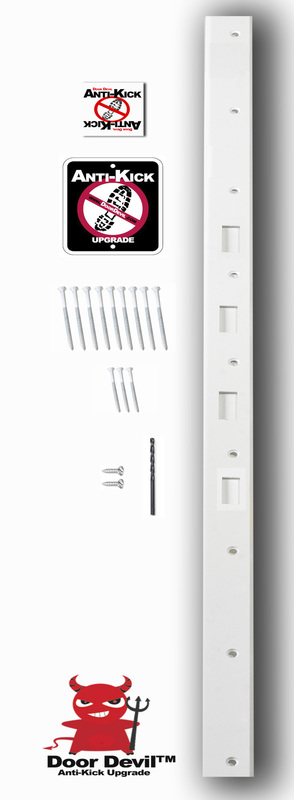|
The locksmith licensing charade, as many of us have been predicting, has been revealed. The result of this charade has been devastating to many within the industry and to the industry as a whole. The winners, if you can call them that, are some of the larger companies. Everyone else - the mom and pop shops, the consumers, the sole proprietors, future locksmiths, many smaller companies, the reputation and character of the locksmith trade, even local economies and government - has lost. This is no exaggeration. Any industry or trade that has suffered the losses the locksmith trade has suffered under the licensing scam has been severely damaged. This damage was not inflicted by outsiders, but by self-anointed leaders of the trade. This damage was not inflicted by outsiders, but by self-anointed leaders of the trade. Imagine if 80 percent of electricians left their jobs. Imagine if 4 out of 5 doctors walked away from their practices. Imagine if there was only one fifth the number of car mechanics available. This is what has happened within our industry and, no, this has nothing to do with Covid-19. This is what happened in the state of Tennessee in the ten year period following the introduction of their locksmith licensing law. In 2006, there were about 5,000 licensed locksmiths in Tennessee. In 2016, the number was reduced to under 1000. (https://tennesseestar.com/2020/03/09/tennessee-subcommittee-will-reconsider-ending-locksmith-licensing-if-budget-allows/) The above-referenced article from the Tennessee Star, written by Tyler Arnold, published March 9, 2020 refers to the dwindling number of locksmiths as “the downfall of the industry.” He reports that Tennessee State Representative “Jay Reedy, R-Erin, told the House Finance, Ways and Means Subcommittee that the state’s licensing requirement has contributed to the downfall of the industry. He said there were about 5,000 locksmiths in the state when the state started mandating the license in 2006, but this number dropped to below 1,000 in 2016.” The good news is that Tennessee has no dropped its locksmith licensing requirements. Effective May 27, 2021, Tennessee is no longer licensing locksmiths. Tennessee locksmiths were notified in a letter dated July, 7, 2021 from Tennessee's Department of Commerce and Insurance. It is interesting to note that the Department of Commerce and Insurance’s letter mentions that consumer complaints will still be handled by Tennessee’s Attorney General’s Office. That is where most states handle consumer complaints whether the businesses are licensed or not. In other words, the locksmith licensing law was never really about protecting the consumer, the Attorney General’s Office already did that and will continue to do so. Locksmith licensing laws are a tool for established businesses to limit competition, and Tennessee’s law did that effectively, costing thousands of jobs.
0 Comments
The backset is the distance from the edge of the door to the center of the 2-1/8" bore hole. In the U.S. there are two common backsets for residential and commerical locks, 2-3/8" and 2-3/4". Another way to understand the measurement of the backset is to measure from the edge of a door to the center of the locks keyway. The image seen below is a standard hole preparation for deadbolts and knob/lever locks. You can also identify your backset by measuring you deadbolt or latch. Below is examples of a mortise lock. The backset is also measured from the edge of the door or the locks faceplate to the center of the locks mortise cylinder hole or keyway. The mortise lock has additional dimension which are critical for proper identification and replacement and should be included in your identification process. Call your local Society of Professional Locksmith member when seeking advice or service! If you learned anything from this blog entry or simply liked what you saw, please give it a Like or Tweet! Backset image on this page was created and published on Directdoorhardware.com
As product quality goes down and prices go up, many good locksmiths are seeking alternative products that offer greater value and durability for their customers. Major American brand names from what has become known as the "mega manufacturers" have continued to promote inferior products while at the same time increasing their prices to a point of gross extremes. These products are being made with cheaper parts and barely can be identified as a security device in the eyes of the professional locksmith. With escalating costs that leave the locksmiths scratching their heads and consumers being taken to the cleaners (ripped off), the professional locksmiths are abandoning these brands and recommending value engineered alternatives. We see several of these products in the mega home centers and the consumers are often bamboozled into believing these are adequate devices to protect themselves, their belongings, and their loved ones. In many instances these products under examination are clearly "cheapened" or demonstrate the intentional obsolescence design alterations which will limit their longevity and force an upward sale a short time later. In comparison we see smaller "indie" (independent) start-up companies and imported brands or off-shore private labeled brands with higher quality and lower prices. The durability of these products are exceeding those of the mega manufactures who present themselves as dominate industry players. It is well known that they too are importing their products so why are their products failing so often? It is known as Designed Obsolescence, which means it is intentionally being done by the manufacturers to force the consumer to repurchase. It is also part of a growing pattern with security hardware products manufacturers who are trying to force upon the locksmiths and the consumers their new product designs like electronic locks, or web-enabled devices. Some of these products sound good, but lack the quality expected by the security professionals who work with them. Very often they are dumped into the market and they become part of a form of research & development which leaves the locksmith scrambling to resolve issues, losing money in repeat call backs. All the while the consumer thinks it is the locksmiths fault, when in fact it is the designed obsolescence of the product by the manufacture. I encountered an interesting argument with one mega manufacturer's Product Trainer who was found advocating for locksmith licensing while conducting an educational seminar on his company's product. When I pointed that trying to use a product seminar to pimp failed and harmful licensing was inappropriate and ignorant, his response was this - "How else are we to force the locksmith to learn about new products!" If a product addresses a solution, meets the desire of the consumers, or is durable and cost effective, then it will become sought after. Those who fail to educate themselves won't last in the free market. That is how things work. Trying to re-engineer or social engineer how winners and losers are made by trying to "force" a result by design (licensing) is not much different than cheating the consumers by designed obsolescence! HARD-ware is the business most professional locksmiths are in, and although consumers often gravitate to the cheapest or lowest price, it does not mean they want something that is inferior and is designed to fail. If this is how the mega manufacturers wish to continue, then alternative brand products will continue to be the best choice for the locksmith and the better value for the consumers. The following video is long but very informative. Please leave your comments below about Designed Obsolescence and your experiences with it.
If you are a locksmith, what alternative brands and solutions would you recommend to the consumers? Tell us why? What mega manufacturer brands are you disappointed in? Have you lost money dealing with these brands? Did you have call backs? Did the consumer blame you? Members of he Society of Professional Locksmiths participate in continuing education and professional development programs voluntarily to provide the consumer the best possible service. They investigate and recommend many alternative products of value. If you learned something new from this blog or have more to contribute, please share your comments, give it a Facebook LIKE or Tweet! Written By: Barry Campbell, Director of Operations SOPL  Kurtis Ming, from CBS 13 in Sacramento, recently reported on “The Dark Side of the Locksmith Industry.” There are some notable things about this report, both good and bad. The first is his reference to the “one time nature of locksmiths.” While most professional locksmiths endeavor to foster relationships with repeat, long-term customers, I think Ming has pointed out a popular misconception – that the main reason to call a locksmith is when you've locked yourself out of your home or vehicle, or perhaps to replace a lost car key. Sure, people who think like that probably also think the local hardware store carries the best in lock hardware, but the point is that there is a huge potential market out there of people who simply don't know any better. Then there is the “simple lock picking” comment. More correctly, the report might have focused more on the “simple lock.” Not hard to teach someone to pick open a hardware store lock, but most locksmiths can combinate even these locks to be more difficult to pick. Professional locksmiths also may have the tools and knowledge to enable them to bypass even the “unpickable” lock without damage. Part of the problem, in this case, may have come from within the industry. How many of you have had a call to “pop” a lock? Many are easy, but many are not – sometimes by design and sometimes because of the condition of the lock. Regardless, the implication that picking is easy and should not cost much is unjustified. I rather like the response of locksmith David Knosalla in an article from The Princeton Union-Eagle, where he was able to quickly and easily open a safe - “You called for an expert and that's what you got.” Now, if you carry just a long-reach tool and a drill for all your unlocks, you're no expert; but if you are a professional with the tools and knowledge to tackle virtually any situation, you are justified in charging what you are worth. The article improves when Ming identifies the “locksmiths” called out to unlock the homes, including their license numbers. Yes, what more proof do you need that scammers can get a license whenever they need to? Even better, he confronts a spokesman from the Bureau of Security and Investigative Services that oversees the locksmith licensing. The interview was priceless: Heimerich told Call Kurtis BSIS had received 281 locksmith complaints in the past two years, but Call Kurtis has learned only 17 locksmiths were actually cited, and none had their licenses revoked. That's right; 281 complaints, 17 cited, and not a single license revoked in two years! How many times does it need to be proven? Licensing neither stops the scammers nor protects the consumer! The saddest part of the report, though, had to be the recommendation from the California Locksmith Association (CLA). Given that the ineffectiveness of licensing was just shown, they could only recommend that consumers should verify the locksmith's license. Was that really the best they could do? So in the darkness of it all the Society of Professional Locksmiths has helped shine a light on the shady business of licensing and how it is contributing to a false sense of security and a false sense of safety for the consumers. As these news reports increase we may see some bright sides in the coverage but in the end we find that relying on the idea of someone being licensed is like standing in the dark. Can anyone seriously claim that licensing has illuminated our industry? 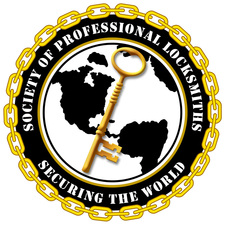 The Society of Professional Locksmiths, along with partnering hardware manufacturers PDQ Hardware, Door Devil, and Global Security Experts came to the aid of crime victim Linda Duncan of Indianapolis, IN. While at church, Mrs. Duncans home was broken into and her late husband's Purple Heart was stolen. SOPL Managing Director Barry Campbell, owner of Altic Lock Service in Indianapolis, coordinated with partnering hardware manufacturers to secure Linda Duncan’s home with a heavy duty PDQ deadbolt, Door Devil jamb and door reinforcement, an OnGard door brace from Global Security Experts, a new entry lock, and a sliding door lock; all at no cost to Mrs. Duncan. “I am humbled by the generosity of these manufacturers and the coordination by the leadership of the Society of Professional Locksmiths to assist a family member of one of our nation's war heros.” Tom Lynch, Founder of the SOPL said. “These manufacturers and Barry went above and beyond the call of duty and I salute them for demonstrating their respect and honor of Cleon Duncan’s service to our country.” Fox News Video & Article - http://fox59.com/2013/10/30/helpful-hoosiers-step-up-to-protect-a-burglary-victim/#axzz2jGHSyFjb PRESS RELEASE - SOPL AIDS CRIME VICTIM
Do you think you have been ripped off? We can Help! FREE Invoice & Estimate Audit Available. What is www.LocksmithRipoffs.com? Locksmith Ripoffs is a consumer resource created to provide audit and review services of work proposed or already performed by locksmiths or other service providers installing security hardware products. Locksmith Ripoffs will assist the consumer in determining how to solve their security needs in a cost effective manner utilizing the proper products and applications which provide more value for their money. We act on your behalf to ensure you are not being ripped off. Why should you use Locksmith Ripoffs? There are many fraudulent scams from unskilled or under educated service providers who do not properly care for the consumers needs or understand how to provide solutions that apply to the consumers problem. In many cases there are reports of over charging, inferior workmanship or materials being sold or installed by unscrupulous contractors. Locksmith Ripoffs utilizes an educated pool of professional locksmiths and security experts from the Society of Professional Locksmiths organization who can quickly examine your situation and provide a solution that assists the consumer in either correcting the problem themselves or being better educated in the process of selecting a service provider.  Calls to locksmiths from consumers regarding a lockout situation are often deemed "emergencies" by the customer. Those offering emergency service or divert normal service to accommodate an emergency call will often prioritize the call with an added charge to cover lost wages from other scheduled work. Some locksmith specialize only in emergency response calls while other "alleged locksmiths" pose as they do. Consumers are often overwhelmed by the idea they are locked out of their home, car or office. The loss of time, the embarrassment and unexpected cost often interferes with their judgment and willingness to listen to the advice many professional locksmiths provide them, and in many cases cost is the single most contributing factor in the acceptance or rejection of a service response. This error results very often in an unsatisfied experience. When a consumer contacts a locksmith during a lockout they should expect to be asked several questions, not just quoted a flat rate. They should also expect to be asked to provide some form of evidence that they have authority to enter or are who they claim to be. These questions are asked to develop an assessment for the locksmith to prepare and to convey both a best and worst case scenario for the consumers situation. This information is the best a locksmith can do without actually being on site to evaluate his/her response or methodology to service the call. Often the responses provided by the consumer do not coincide with the actual conditions found upon arrival by the locksmith and costs can change as a result. If the consumer is not asked for identification prior to any service, then you are not dealing with a professional and should refuse any further service. Your identification information should be included as part of the invoice and retained by the locksmith as a record of the incident should law enforcement inquire. If the consumer is intimidated or threatened in any way, they should contact the police and ask for assistance. The consumer also should ask the locksmith for their identification. A valid state drivers license is something every responding service provider would have. If a locksmith declines to provide the consumer valid identification, the consumer should decline service. If the locksmith is not provided identification when they request it from the consumer, they will decline offering service or ask for police assistance in verifying identity. To determine the difference between a locksmith and those "posing" as locksmith the consumer should ask, "Will you damage my lock?" or "What non-destructive methods of entry will you first attempt to use?." This single question will unfold a discovery process that will reveal the locksmith’s knowledge and intent. In many cases professional locksmiths will express to the consumer during the call for service that they will employ the use of non-destructive methods BEFORE having to drill. If drilling is the recommended method then remember to get a written quote. It is not uncommon for a locksmith to provide a reconditioned replacement part or spare used parts at no charge if a precision drilling procedure must be utilized. Drilling should not destroy the lockset, but may effect a small component which is easily replaced or repaired. In many cases, the cost to provide such parts is minimal and often built into the cost of the service.
Members of he Society of Professional Locksmiths participate in continuing education and professional development programs to provide the consumer the best possible service. Call your local SOPL Locksmith to receive professional advice and service. http://www.locksmithripoffs.com/index.html 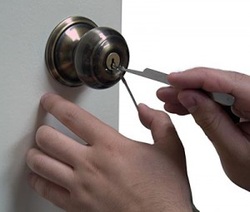 Picking a lock is not as simple as many may think. It is not Hollywood where something is simply inserted into a lock and it magically opens. Picking is an acquired skill set that takes much practice and very often can still be unsuccessful for a variety of reasons. It is one of many options when faced with a "lockout" situation. The addition of specialized "top pins" can make a low cost residential lock very difficult to pick. Certain locks require specialty picks or other associated devices that are prohibitive in cost for many local locksmiths. Most locksmiths will cease picking attempts beyond 5-15 minutes and resort to alternative methods. Skills in "bypassing" a lock vary and very often one locksmith may possess a technique others do not. Such knowledge is simply discovered through time, experience or networking within their peer group. Bypassing a lockset in some cases is faster then picking or drilling. The choice to drill a lock open is an accepted trade practice and one that is taught in the industry. Drilling a lock open requires "strategic" drill points which are designed to prevent the least amount of damage possible to the lockset and mostly focuses on the cylinder alone. In many cases this method can result in a low cost corrective repair, in some cases replacement of the hardware is required. Those who resort to drilling without troubleshooting or applying alternative options such as bypassing or picking first may lack access to the proper tools through supply distribution and may not even be practicing locksmiths although they are attempting to be. Suppliers or Distributors require certain information and references from locksmiths who require such tools or training and many of the staff within the distribution channels were active locksmiths involved in their local network and know who is credible and competent. They will block access to possession of lock or bypass tools at their discretion. As a consumer, should your locksmith recommend drilling your lockset to gain entry if you are locked out of your home or business, make sure you ask the following questions -
Is there an alternative bypass method? Can you check other points of entry first? Will it damage the lockset or lock body? Is it repairable? What is the cost of replacement? Another question a consumer can ask is - Will you use non-destructive methods of entry? This sounds like an odd question when we speak of drilling something, but the question is something every professional locksmith understands. Strategic drilling, reduces or eliminates damage to the locket to such a degree that it can be consider non-destructive and which is either repairable or allows for parts replacement at a controlled cost, which the consumer is informed of prior to any drilling. Professional locksmiths who understand consumer protection, customer care and door hardware will explain to the consumers all options and costs prior to any drilling. Members of he Society of Professional Locksmiths participate in continuing education and professional development programs to provide the consumer the best possible service. Call your local SOPL Locksmith to receive professional advice and service. What questions do think should be asked? Door hardware and locks have a life cycle, and depending upon the type, grade and application, may or may not be repairable. It is often more cost effective to replace then to repair. Higher grade hardware often is repairable, however repair parts can often be costly and it becomes more cost effective to replace with a new lock. Each scenario is different and must be examined.
A professional locksmith will ask several questions from the consumer prior to arriving at your location. Consumers should ask questions. A more educated estimate can be given and it allows the locksmith to be better prepared to resolve the problem quickly and educate the consumer as to their best solution. Any person who claims to be a locksmith, but will not spend the time to ask questions or listen to the consumers concerns, is probably not a good choice for service. Although a fair estimate can be given over the telephone, a final estimate should be given after the locksmith actually sees the door hardware, it's installation and condition. Ask your locksmith for a written estimate, but keep in mind that sometimes when a piece of door hardware is removed, there could be other problems found. Improper prior work or bad installations and missing parts must be corrected in order for a warranty to be honored. The "alleged locksmiths" referred to as "scammers" often are incapable of repairing a damaged lock since they do not know how to make repairs, obtain proper replacement parts or have access to purchase them through the supply houses or distribution channels. They also don't engage the consumers as described above. Professional locksmiths who understand consumer protection, customer care and door hardware want to talk to the consumers. Like retail clothing chain store legend Sy Sym's slogan said, “An Educated Consumer is our Best Customer.” As a consumer you should ask your professional locksmith any of the following questions: What are my options? Is there alternatives? What is the cost comparison? What is the cost of ownership? What Grade is the product? Is there a warranty on the product? Is there a warranty on the installation? Is it repairable? Is it cost effective? What is the best value? Members of he Society of Professional Locksmiths participate in continuing education and professional development programs to provide the consumer the best possible service. Call your local SOPL Locksmith to receive professional advice and service. What questions do you think should be asked? |
Categories
All
|
||||||||
Services |
Company |
|
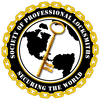

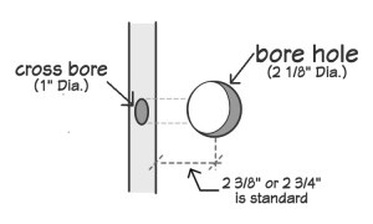
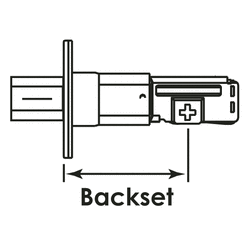
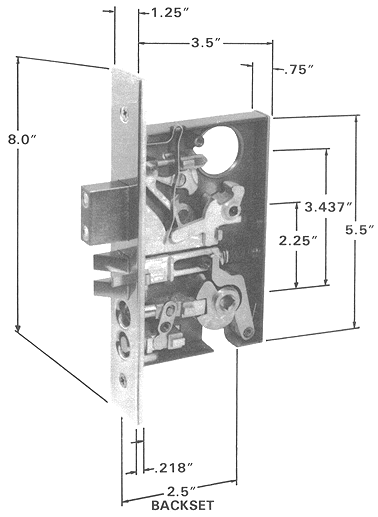
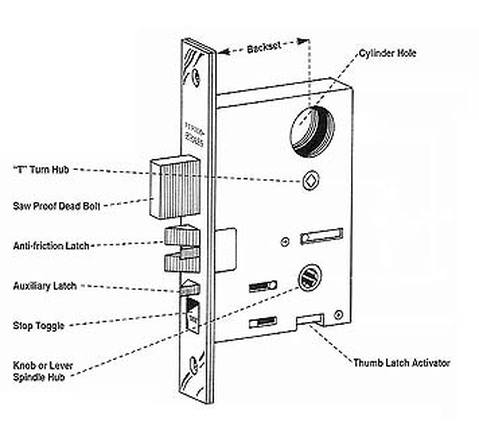
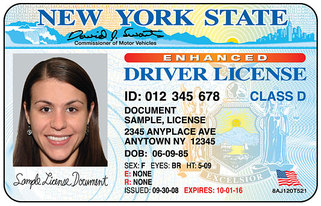
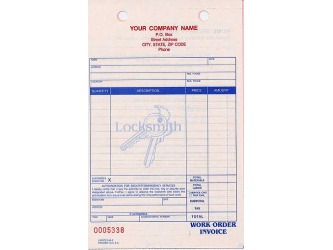
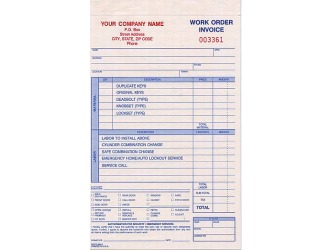
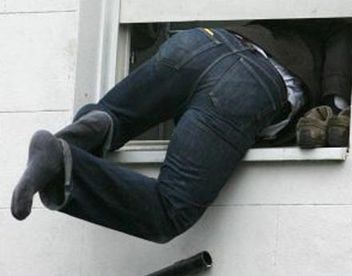
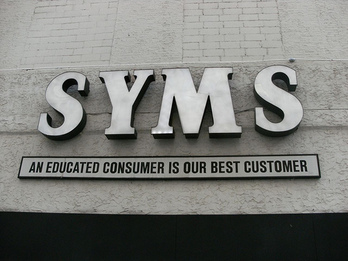
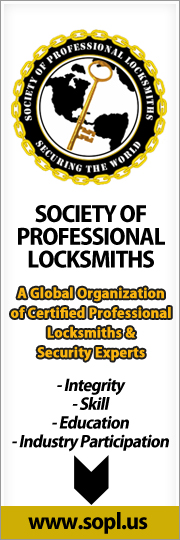

 RSS Feed
RSS Feed
